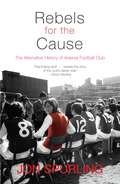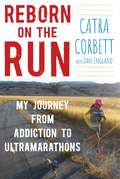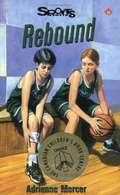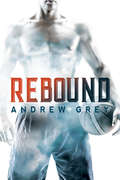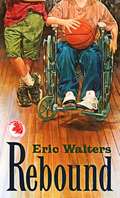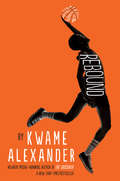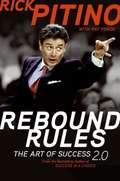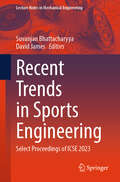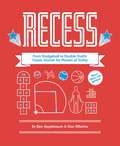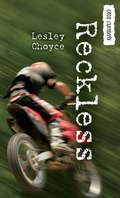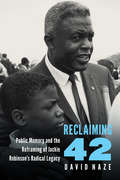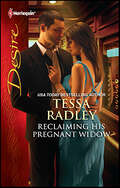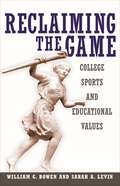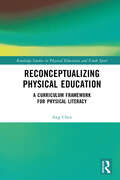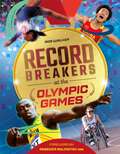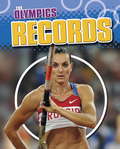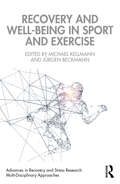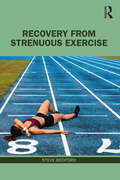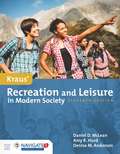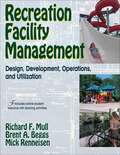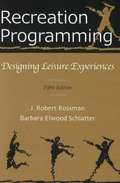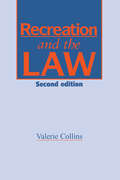- Table View
- List View
Rebels for the Cause: The Alternative History of Arsenal Football Club
by Jon SpurlingArsenal's on-field success has been well documented. But what has never been written before is the equally remarkable history of Arsenal's rebels, both on and off the pitch. Spanning almost 120 years, and set against a backdrop of turbulent social and political change, Rebels for the Cause assesses the legacy and impact of Arsenal's most controversial players, officials and matches. From hard men like '30s player Wilf Copping to the reformed wild ones of recent years such as Tony Adams, Jon Spurling highlights the infamous figures whose refusal to conform has made them terrace legends. Mavericks such as '80s star Charlie Nicholas and the 'King of Highbury' Charlie George are here, as are '70s lads Alan Hudson and Malcolm Macdonald. The book also focuses on the club's revolutionary founding fathers, David Danskin and Jack Humble, the terrifying '20s 'soccer Tsar' Sir Henry Norris and David Dein's controversial introduction of free-market economics to Highbury in the regressive '80s. Also investigated are the stories behind Arsenal's most infamous tabloid exposés. Featuring extensive interviews with 15 former players, Rebels for the Cause is an indispensable guide to the alternative history of Arsenal Football Club, shedding new light on the origins of the rivalry with Tottenham, on many of Highbury's cult heroes and on the struggle of several players to adapt to life outside the game.
Reborn on the Run: My Journey from Addiction to Ultramarathons
by Catra CorbettAside from her rock star looks, Catra Corbett is a standout in the running world on her accomplishments alone. Catra is the first American woman to run over one hundred miles or more on more than one hundred occasions and the first to run one hundred and two hundredmiles in the Ohlone Wilderness, and she holds the fastest known double time for the 425-miles long John Muir Trail, completing it in twelve days, four hours, and fifty-seven minutes. And, unbelievably, she's also a former meth addict. After two years of addiction, Catra is busted while selling, and a night in jail is enough to set her straight. She gives up drugs and moves back home with her mother, abandoning her friends, her boyfriend, and the lifestyle that she came to depend on. Her only clean friend pushes her to train for a 10K with him, and surprisingly, she likes it?and decides to run her first marathon after that. In Reborn on the Run, the reader keeps pace with Catra as she runs through difficult terrain and extreme weather, is stalked by animals in the wilderness, and nearly dies on a training run but continues on, smashing running records and becoming one of the world?s best ultrarunners. Along the way she attempts suicide, loses loved ones, falls in love, has her heartbroken, meets lifelong friends including her running partner and dachshund TruMan, and finally faces the past that led to her addiction.
Rebound
by Adrienne MercerAll C.J. has ever wanted is to play basketball--one day pro basketball. Already in grade nine she's the captain of her high school team in Naskup, British Columbia. But her success comes at a price: her teammate Debi can't accept someone so young as captain, and is making C.J.'s life as difficult as possible. To make matters much worse, one morning she wakes up and is barely able to get out of bed. When her doctor tells her she has arthritis, she worries whether she deserves to be captain. Recognizing her new limitations, however, she comes to truly understand teamwork, and becomes the leader her coaches knew she could be. Rebound is the story of how one young athlete overcomes adversity to become a better player, and a better person.
Rebound
by Andrew GreyProfessional basketball player Bri Early needs a physical therapist after an injury, and he’s heard that Obie is the best. Bri takes an immediate liking to the out-and-proud man with the magic touch, and even though Bri isn’t openly gay himself, he’d never let anything stand in the way of something he wants. Obie can’t deny that the sexy athlete presses all his buttons, but he’s a professional and has no intention of getting involved with a client. While they’re working together, it’s hands off, no matter how great the temptation. But being a pro athlete isn’t easy. Bri has enemies, and one of them is making his life hell. When his house is set ablaze, Bri can no longer pretend the threatening messages he’s receiving are jokes. He needs a safe place to stay, and Obie can’t turn his back. But the two of them in the same house is a recipe for combustion that could burn them both….
Rebound
by Eric WaltersIt's like I said, it isn't what you do with the shots you make, but the ones that don't go in. The rebounds Sean vows that this year will be different: he'll stay out of trouble and make the basketball team, even if it means ditching his old friends.
Rebound (Fountas & Pinnell Classroom, Guided Reading Grade 6)
by Patrick Jones Ben ShannonPLAYING DIRTY NUMBER 24 IS PLAYING DIRTY, AND NOTHING MAKES TITUS MORE ANGRY. BUT WILL ANGER HELP HIM WIN THE GAME? NIMAC-sourced textbook
Rebound (The Crossover Series)
by Kwame AlexanderFrom the New York Times bestselling author Kwame Alexander comes Rebound, a dynamic novel in verse and companion to his Newbery Award-winner, The Crossover, illustrated with striking graphic novel panels. <P><P> Before Josh and Jordan Bell were streaking up and down the court, their father was learning his own moves. In this prequel to Newbery Medal winner The Crossover, Chuck Bell takes center stage, as readers get a glimpse of his childhood and how he became the jazz music worshiping, basketball star his sons look up to. <P>A novel in verse with all the impact and rhythm readers have come to expect from Kwame Alexander, Rebound will go back in time to visit the childhood of Chuck "Da Man" Bell during one pivotal summer when young Charlie is sent to stay with his grandparents where he discovers basketball and learns more about his family's past. <P><b>A New York Times Bestseller</b>
Rebound Rules
by Rick Pitino Pat FordeRick Pitino is a basketball icon: the only coach in college history to lead three different schools to the Final Four, the winner of the 1996 NCAA championship, the owner of a sparkling career record, a bestselling author, and a lock for the College Basketball Hall of Fame. Yet Pitino's journey has not been without life-altering adversity: He's experienced profound personal and professional losses. In 2001, after three losing seasons as coach and president of the Boston Celtics, Pitino resigned, walking away from the $23 million left in his contract. And while recovering from the only breakdown in his extraordinary basketball career, Pitino--who had previously suffered the devastating loss of his infant son, Daniel--endured additional tragedies: His brother-in-law and best friend Billy Minardi, a trader at Cantor Fitzgerald, perished in the World Trade Center attacks of 9/11, less than a year after another brother-in-law had been fatally struck by a taxi. Pitino writes, "From that point on, my life changed forever. Nothing will ever be the same." This realization gave Pitino a new perspective. With it, the innovative leader felt the freedom to act even more dynamically than he ever had in the past. Returning to college basketball, he has rebuilt and revitalized the storied program at Louisville, guiding the Cardinals to a history-making Final Four appearance in 2005 that stamped him the only coach in history to take three schools that far. And in 2008, he rallied an injury-plagued Louisville team from a disappointing start and led it to the Elite Eight, setting the stage for greater success to come. The failures and tragedies he recounts make this book unique. More than just a recitation of what works and why, it's about how to succeed after you've failed; how to pick yourself up after being knocked down; and how to reframe yourself and see the world in a new light. This is a comeback story, a manual for overcoming life's difficulties. Pitino has experienced success as an author with his tremendously popular books Success Is a Choice and Lead to Succeed, but in Rebound Rules: The Art of Success 2.0, he's crafted a book that's more deeply personal, more inspiring, more practical, and more powerful than any he's written before.
Recent Trends in Sports Engineering: Select Proceedings of ICSE 2023 (Lecture Notes in Mechanical Engineering)
by David James Suvanjan BhattacharyyaThis book presents the select proceedings of 3rd International Conference on Sports Engineering (ICSE 2023). It bridges the gap between sports industry and academia for improving sports infrastructure and facilities. Various topics covered in this book are design, manufacturing and testing of synthetic sports surfaces, design of training aids in sports, fitness and recreation activities, simulation and mathematical modelling of sports performance, designing sports facilities including indoor and outdoor Stadium, wearable exoskeletons and prosthesis in para sports, Olympic and Paralympic Sports equipment, artificial intelligence in sports training & performance, machine learning and computer vision, computer-aided design and application in sports, computer supported sports training and performance prediction, video analysis and image processing, sports analytics and data science. The book is useful for researchers and professionals working in the area of sports engineering.
Recess: From Dodgeball to Double Dutch
by Ben Applebaum Dan DiSorboWe could all use a break. This guide to the schoolyard games of childhood is “something special” (The Wall Street Journal).Remember recess? It was that refreshing break between classes that cleared the cobwebs, refreshed the mind, and got everyone moving. Recess is the ultimate illustrated guide to the best games of the playground, for inside or outside, kids or grownups. With detailed instructions, diagrams, and a can-do attitude, this fun guide includes the rules to more than 150 games and variations, including more than two dozen international games from schoolyards around the world, plus tips and strategies for winning!“Remember, your 30-year-old self isn’t quite as adept at dodging a ball as your 10-year-old self was, but spending your lunch hour at work playing in the parking lot is a lot better than catching up on your friends’ boring Facebook updates.” —Gizmodo
Reckless (Orca Currents)
by Lesley ChoyceJosh knows he's riding recklessly when he knocks down the old man he suspects is the hermit of Loggerman Creek. Josh is shocked when the hermit walks into the forest with his bike after the accident. Being without his beloved bike for a week motivates him to hike into the woods and confront the crazy old man. The hermit, Jonathan, has fixed Josh's bike, and Josh learns that he has more in common with the old man than he ever imagined. When Jonathan needs help, Josh has to respect the old man's choices in order to save his life. This short novel is a high-interest, low-reading level book for middle-grade readers who are building reading skills, want a quick read or say they don’t like to read!
Reclaiming 42: Public Memory and the Reframing of Jackie Robinson's Radical Legacy
by David NazeReclaiming 42 centers on one of America’s most respected cultural icons, Jackie Robinson, and the forgotten aspects of his cultural legacy. Since his retirement in 1956, and more strongly in the last twenty years, America has primarily remembered Robinson’s legacy in an oversimplified way, as the pioneering first black baseball player to integrate the Major Leagues. The mainstream commemorative discourse regarding Robinson’s career has been created and directed largely by Major League Baseball (MLB), which sanitized and oversimplified his legacy into narratives of racial reconciliation that celebrate his integrity, character, and courage while excluding other aspects of his life, such as his controversial political activity, his public clashes with other prominent members of the black community, and his criticism of MLB. MLB’s commemoration of Robinson reflects a professional sport that is inclusive, racially and culturally tolerant, and largely postracial. Yet Robinson’s identity—and therefore his memory—has been relegated to the boundaries of a baseball diamond and to the context of a sport, and it is within this oversimplified legacy that history has failed him. The dominant version of Robinson’s legacy ignores his political voice during and after his baseball career and pays little attention to the repercussions that his integration had on many factions within the black community.Reclaiming 42 illuminates how public memory of Robinson has undergone changes over the last sixty-plus years and moves his story beyond Robinson the baseball player, opening a new, broader interpretation of an otherwise seemingly convenient narrative to show how Robinson’s legacy ultimately should both challenge and inspire public memory.
Reclaiming His Pregnant Widow
by Tessa RadleyLong presumed dead, antiquities dealer Brand Noble has finally clawed his way back to New York City. Only to find his wife, Clea, pregnant...and engaged to another man? She hadn't wasted any time in moving on. It will not do. Brand will have her back-no matter what.Clea had held out to the bitter end before tearfully having Brand declared dead. Now he's jumped to conclusions about her condition, and his unwillingness to believe her explanation is unbearable.She will not be reclaimed-or so she tells herself. Even as her resistance melts under his scorching caresses.
Reclaiming the Game: College Sports and Educational Values (The William G. Bowen Series #40)
by William G. Bowen Sarah A. LevinIn Reclaiming the Game, William Bowen and Sarah Levin disentangle the admissions and academic experiences of recruited athletes, walk-on athletes, and other students. In a field overwhelmed by reliance on anecdotes, the factual findings are striking--and sobering. Anyone seriously concerned about higher education will find it hard to wish away the evidence that athletic recruitment is problematic even at those schools that do not offer athletic scholarships. Thanks to an expansion of the College and Beyond database that resulted in the highly influential studies The Shape of the River and The Game of Life, the authors are able to analyze in great detail the backgrounds, academic qualifications, and college outcomes of athletes and their classmates at thirty-three academically selective colleges and universities that do not offer athletic scholarships. They show that recruited athletes at these schools are as much as four times more likely to gain admission than are other applicants with similar academic credentials. The data also demonstrate that the typical recruit is substantially more likely to end up in the bottom third of the college class than is either the typical walk-on or the student who does not play college sports. Even more troubling is the dramatic evidence that recruited athletes "underperform:" they do even less well academically than predicted by their test scores and high school grades. Over the last four decades, the athletic-academic divide on elite campuses has widened substantially. This book examines the forces that have been driving this process and presents concrete proposals for reform. At its core, Reclaiming the Game is an argument for re-establishing athletics as a means of fulfilling--instead of undermining--the educational missions of our colleges and universities.
Reconceptualizing Physical Education: A Curriculum Framework for Physical Literacy (Routledge Studies in Physical Education and Youth Sport)
by Ang ChenPhysical education curricula evolved to emphasize physical training, personal hygiene, character development, fitness development, sports competency, and health. These emphases led to different ways to conceptualize the curricula for primary and secondary schools. This book raises a need to re-conceptualize the physical education curriculum and proposes a life-scan perspective for physical education curriculum conceptualization. Reconceptualizing Physical Education proposes a conceptual framework to focus on the life journey of physical activity, which is guided by the monist perspective and a lifelong approach to physical literacy. Section I of the book lays out important theoretical articulation for a two-dimensional framework with the goal of educating the learner to take a lifelong perspective to personal health and physically active lifestyles. Section II presents curriculum frameworks designed for primary schools and secondary schools. In each framework chapter, the details of content and learning tasks are discussed in terms of the two-dimensional functions. Each framework may be used directly for curriculum development. The book is intended for curriculum scholars and researchers in physical education, graduate students in health and physical education curriculum studies, and teachers in physical education and health education. It may also be of interest of researchers and graduate students in kinesiology fields and public health.
Reconceptualizing Physical Education: A Curriculum Framework for Physical Literacy (Routledge Studies in Physical Education and Youth Sport)
by Ang ChenPhysical education curricula evolved to emphasize physical training, personal hygiene, character development, fitness development, sports competency, and health. These emphases led to different ways to conceptualize the curricula for primary and secondary schools. This book raises a need to re-conceptualize the physical education curriculum and proposes a life-scan perspective for physical education curriculum conceptualization. Reconceptualizing Physical Education proposes a conceptual framework to focus on the life journey of physical activity, which is guided by the monist perspective and a lifelong approach to physical literacy. Section I of the book lays out important theoretical articulation for a two-dimensional framework with the goal of educating the learner to take a lifelong perspective to personal health and physically active lifestyles. Section II presents curriculum frameworks designed for primary schools and secondary schools. In each framework chapter, the details of content and learning tasks are discussed in terms of the two-dimensional functions. Each framework may be used directly for curriculum development. The book is intended for curriculum scholars and researchers in physical education, graduate students in health and physical education curriculum studies, and teachers in physical education and health education. It may also be of interest of researchers and graduate students in kinesiology fields and public health.
Record Breakers at the Olympic Games: At The Olympic Games
by Rob WalkerRecord Breakers at the Olympic Games celebrates the best records, achievements and stories in the history of the modern summer Olympic Games.Comprehensive in scope, the book features record performances in every sport and discipline since Athens 1896, and highlights the jawdropping efforts and dramatic moments that make up the Games' tapestry of tales. Additonally, the book charts new sporting additions, such as skateboarding and rock-climbing, which have attracted a new legion of young fans. There is also a section devoted to the Paralympics, citing the stars and star performances that have propelled the profile of the Paralympic movement in modern times. This is a perfect guide for young fans in the run up to the Paris Games in 2024.
Records (The Olympics #4)
by Moira ButterfieldEach title of The Olympics examines the the Olympic Games from ancient times, then the revival of the 1890s through to today's multi-million pound business. From the history of the games to which events are included and why, and from scandals to record breakers, The Olympics puts the reader at the centre of the action with fact-packed text, dramatic full-colour photos, facts and statistics.
Records (The\olympics Ser.)
by Moira ButterfieldEach title of The Olympics examines the the Olympic Games from ancient times, then the revival of the 1890s through to today's multi-million pound business. From the history of the games to which events are included and why, and from scandals to record breakers, The Olympics puts the reader at the centre of the action with fact-packed text, dramatic full-colour photos, facts and statistics.
Recovery and Well-being in Sport and Exercise: Interdisciplinary Insights
by Michael Kellmann Jürgen BeckmannBringing together the world’s leading experts, this multi-disciplinary collection examines both the psychological and physiological dimensions to recovery from sport. Featuring chapters on overtraining, sleep, the relationship to injury, as well as the role of stress, this volume illustrates how performance, both as an individual and within of a team, can be better managed through understanding the recovery process. It also covers the impact of travel on performance, as well as guidance on measurement and training. Based upon the contemporary models of recovery and performance in different scientific disciplines such as medicine, neuroscience, psychology, and sport science, expert contributors also explore implications for applied and strategic interventions to retain and stabilize performance ability. This is a must-have resource for students and scholars across the sports sciences as well as any coach interested in the latest research. This book in this new series is essentially a new edition of the book Sports, Recovery, and Performance under a new title, Recovery and Well-being in Sport and Exercise. Even though there is a large overlap between the 2018 book and this first book of the series, several modifications have been made: some chapters were omitted, new chapters were added, and some chapters have been substantially updated and revised.
Recovery from Strenuous Exercise
by Steve BedfordCoaches, managers and athletes frequently ask about how they can recover as fast as possible from fatigue and improve subsequent performance. Recovery from Strenuous Exercise informs students, athletes and practicing strength and conditioning coaches and performance therapists on how to use the latest scientific evidence to inform their recovery practice – particularly during high training volumes and competitive cycles. This book empowers the athlete, the coach and the therapist by giving them greater confidence, improving their critical thinking, helping them to avoid poor practice and enhancing their understanding of what causes fatigue and how its effects can be minimised. Recovery from Strenuous Exercise covers many of the aspects required to make a highly skilled, confident, knowledgeable personal trainer, sports therapist or strength and conditioning coach. It also acts as a recovery ‘go-to’ guide for competitive recreational athletes who lack the knowledge and guidance on optimal recovery protocols used by their professional peers. This text serves as a learning and research aid for athletes and those studying vocational personal training and sports therapy courses, and those studying other courses where recovery modalities form part of their undergraduate and postgraduate study, such as strength and conditioning, sports science, sports therapy, sports rehabilitation, osteopathy and physiotherapy.
Recreation And Leisure In Modern Society
by Amy Hurd Daniel McLean Denise M. AndersonEach new print copy includes Navigate 2 Advantage Access that unlocks a comprehensive and interactive eBook, student practice activities and assessments, a full suite of instructor resources, and learning analytics reporting tools. Reorganized and streamlined to enhance learning outcomes, the eleventh edition of Kraus' Recreation and Leisure in Modern Society provides a detailed introduction to the history, developments, and current trends in leisure studies. The Eleventh Edition focuses on the challenges and opportunities impacting the profession--including dramatic demographic changes, new technologies, and innovations in marketing--through an array of pedagogical features, including engaging sidebars and case studies addressing contemporary issues. Focusing on the ten different types of organizations--ranging from nonprofit community organizations and armed forces recreation to sports management and travel and tourism sponsors--the Eleventh Edition is an invaluable resource for students considering a career in the recreation and leisure industry. With Navigate 2, technology and content combine to expand the reach of your classroom. Whether you teach an online, hybrid, or traditional classroom-based course, Navigate 2 delivers unbeatable value. Experience Navigate 2 today at www.jblnavigate.com/2.
Recreation Facility Management: Design, Development, Operations And Utilization
by Richard F. Mull Brent A. Beggs Mick RenneisenRecreation facility management is a complex responsibility. Professionals in this field are responsible for various types of facilities—recreation centers, water parks and pools, playgrounds, parks, fitness centers, sport complexes, and resorts—each with its own set of goals and challenges. Recreation Facility Management: Design, Development, Operations, and Utilization provides students and new professionals with a basic understanding of recreation facilities and prepares them to perform the duties required of a recreation facility manager. Part I of Recreation Facility Management offers a detailed look at the foundations of the profession, including the defining characteristics of recreation facility management and descriptions of the duties of a recreation facility manager and the areas within the facilities. Also featured are descriptions of the common indoor and outdoor elements of facilities, including sites, spaces, lighting, surfaces, utilities, landscaping, walkways, and parking areas. The remaining parts of the book detail the practical knowledge and skills as well as tasks and processes required for managing various types of recreation facilities. Readers will find these features: A thorough discussion of the facility design and development process, including needs assessment, planning, reading blueprints, funding, the bid process, and construction Information on managing facility resources, including equipment; financial issues, such as budgeting, taxes, fees and charges, and donations; and human resources, including hiring, training, and evaluating employees A detailed examination of facility utilization, including safety and security, scheduling, maintenance, and emergencies and emergency response A review of parks, playgrounds, aquatic facilities, and ancillary spaces, including parking areas, showers and restrooms, and child care areas Coverage of national industry standards and guidelines for various types of facilities Throughout the book readers will find examples from settings in recreation, leisure, parks, and tourism that will help them apply their knowledge to various types of recreation facilities. Recreation Facility Management also includes access to an online student resource (OSR) that will help students tie the information in the book to practical matters on the job. The OSR contains learning activities, forms from the files of actual facility managers, worksheets, and Web links to help students further explore the ideas found in the book. Recreation Facility Management offers a practical introduction to facility design, management, and maintenance for practicing or future recreation professionals. This resource provides the knowledge and skills necessary for becoming a successful facility manager in any recreation setting.
Recreation Programming
by J. Robert Roseman Barbara Elwood SchlatterUsed in numerous universities throughout the United States, Canada, Australia, and New Zealand, this book provides programming insights for educators, practitioners, and students. This book will present readers with the vital tools necessary in providing successful programs for their patrons.
Recreation and the Law
by Ms V CollinsFor the second edition of this successful book the contents have been fully updated to take into account recent changes in legislation affecting recreational activities. It also considers the implications for all those concerned with the operation and management of recreational facilities.
